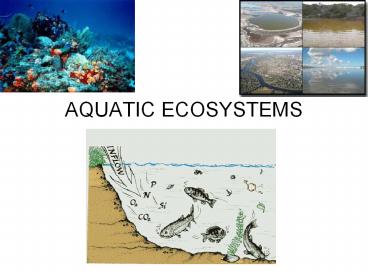AQUATIC ECOSYSTEMS - PowerPoint PPT Presentation
Title:
AQUATIC ECOSYSTEMS
Description:
AQUATIC ECOSYSTEMS What are the basic needs of aquatic biota (organisms)? CO2 O2 Sunlight Nutrients- food & minerals Types of Aquatic Ecosystems Freshwater ... – PowerPoint PPT presentation
Number of Views:759
Avg rating:3.0/5.0
Title: AQUATIC ECOSYSTEMS
1
AQUATIC ECOSYSTEMS
2
What are the basic needs of aquatic biota
(organisms)?
- CO2
- O2
- Sunlight
- Nutrients- food minerals
3
Types of Aquatic Ecosystems
- Freshwater Ecosystems
- Standing Water- lakes ponds
- Moving Water- rivers streams
- Transitional Communities
- Estuaries
- Wetlands- bogs/fens, swamps, marshes
- Marine Ecosystems
- Shorelines
- Barrier Islands
- Coral Reefs
- Open Ocean
4
Freshwater Ecosystems
- Usually 0.005 salt
- Some exceptions
- Great Salt Lakes-
- 5-27 salt
- Dead Sea- 30 salt
- Moving water- high elevations cold high O2
trout streamlined plants - Standing water- lower elevations warmer less
O2 bass, amphibians cattails, rushes - Why would there be less oxygen in standing water?
5
Plankton
- Plankton is a general term for the tiny,
free-floating organisms that live in both
freshwater and saltwater environments. - Unicellular algae, or phytoplankton, are
supported by nutrients in the water and form the
base of many aquatic food webs. - Planktonic animals, or zooplankton, feed on the
phytoplankton.
6
Transitional Communities
Delta
- ESTUARIES
- Where freshwater dumps into ocean
- Brackish water (less salty than seawater)
- Has rich sediments that often form deltas
- Productive biodiverse
- Organisms adapted to varying levels of salinity
as tide ebbs flows - Nursery for larval forms of many aquatic
species of commercial fish shellfish
7
Transitional Communities
- WETLANDS
- Land saturated at least part of the year
- Swamps- have trees like bald cypress high
productivity - Marshes- no trees tall grasses high
productivity - Bogs/Fens- may or may not have trees waterlogged
soil with lots of peat low productivity - Fens- fed by groundwater surface runoff
- Bogs- fed by precipitation
Swamp
Marsh
Bog
Fen
8
Importance of Wetlands
- Highly productive- get lots of sunlight, ? plants
- ? animals
- Nesting, breeding ground for migratory birds
- Slows flooding by absorbing runoff
- Silt settles, making water clearer nutrient
rich - Trap filter water, Bacteria in soil break down
contaminants - Natures Septic Tank
- Natural chemical rxns neutralize and detoxify
pollutants - Gives H2O time to percolate (filter thru soil)
replenish underground aquifers - Threats- artificial eutrophication (see slide
13), draining, sedimentation via construction
9
Marine Ecosystems
- Benthic zone - lowest level. Organisms living in
this zone are called benthos. - Photic Zone well-lit upper layer of the oceans.
- Aphotic Zone - permanently dark layer of the
oceans below the photic zone
10
MARINE ECOSYSTEMS
- CORAL REEFS
- Clear, warm shallow seas
- Made up of accumulated calcareous (made of
calcium) skeletons of coral animals - Formation of reefs depends on light penetration.
- Corals have a symbiotic relationship with algae
(which are photosynthetic) . - Very diverse, abundant (Rainforests of Sea)
- Threats- destructive fishing (cyanide dynamite
to stun fish), pet trade about 75 of coral
reefs have been destroyed
11
What factors can alter aquatic ecosystems?
- Natural Succession- normal cycle of pond becoming
forest - Artificial Succession- humans add Nitrogen
Phosphate to water via fertilizer sewage
causing succession to happen faster
EUTROPHICATION
12
What factors can alter aquatic ecosystems?
- Humans!
- Find food
- Recreation
- Waste disposal
- Cooling of power plants
- Transportation
- Dams, canals































